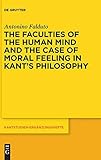The Faculties of the Human Mind and the Case of Moral Feeling in Kant’s Philosophy / Antonino Falduto.
Material type: TextSeries: Kantstudien-Ergänzungshefte ; 177Publisher: Berlin ; Boston : De Gruyter, [2014]Copyright date: ©2014Description: 1 online resource (266 p.)Content type:
TextSeries: Kantstudien-Ergänzungshefte ; 177Publisher: Berlin ; Boston : De Gruyter, [2014]Copyright date: ©2014Description: 1 online resource (266 p.)Content type: - 9783110350029
- 9783110370553
- 9783110351149
- online - DeGruyter
- Issued also in print.
| Item type | Current library | Call number | URL | Status | Notes | Barcode | |
|---|---|---|---|---|---|---|---|
 eBook
eBook
|
Biblioteca "Angelicum" Pont. Univ. S.Tommaso d'Aquino Nuvola online | online - DeGruyter (Browse shelf(Opens below)) | Online access | Not for loan (Accesso limitato) | Accesso per gli utenti autorizzati / Access for authorized users | (dgr)9783110351149 |
Frontmatter -- Contents -- Introduction -- I: The concept of Human Mental Faculties -- II: The Mind and Its Faculties in Contemporary Kant Scholarship -- III: Anthropology and Kant’s study of the faculties of the Human Mind -- IV: Kant’s System of the Faculties of the Human Mind -- V: Interpreting Kant’s Concept of Moral Feeling on the Basis of his Theory of the Faculties -- Bibliography and Abbreviations -- Author index -- Subject index
restricted access online access with authorization star
http://purl.org/coar/access_right/c_16ec
In the past few decades a remarkable change occurred in Kant scholarship: the "other" Kant has been discovered, i.e. the one of the doctrine of virtue and the anthropology. Through the rediscovery of Kant's investigations into the empirical and sensuous aspects of knowledge, our understanding of Kant's philosophy has been enriched by an important element that has allowed researchers to correct supposed deficiencies in Kant's work. In addition, further questions concerning the nature of Kant's philosophy itself have been formulated: the more the "other" Kant comes to the fore, the stronger the question concerning the connection between pure philosophy and empirical investigation becomes.The aim of this study is to show that the psychological and anthropological interpretations of Kant's pure philosophy are not convincing and at the same time to illustrate some connections between his critical and anthropological investigations by means of an analysis of the theory of the faculties.Against both a "transcendental psychological" and an "anthropological" reading, the book presents Kant's theory of the faculties as a constitutive part of his critical philosophy and shows that there is a close connection between Kant's pure philosophy and his moral aesthetic.
Issued also in print.
Mode of access: Internet via World Wide Web.
In English.
Description based on online resource; title from PDF title page (publisher's Web site, viewed 28. Feb 2023)


